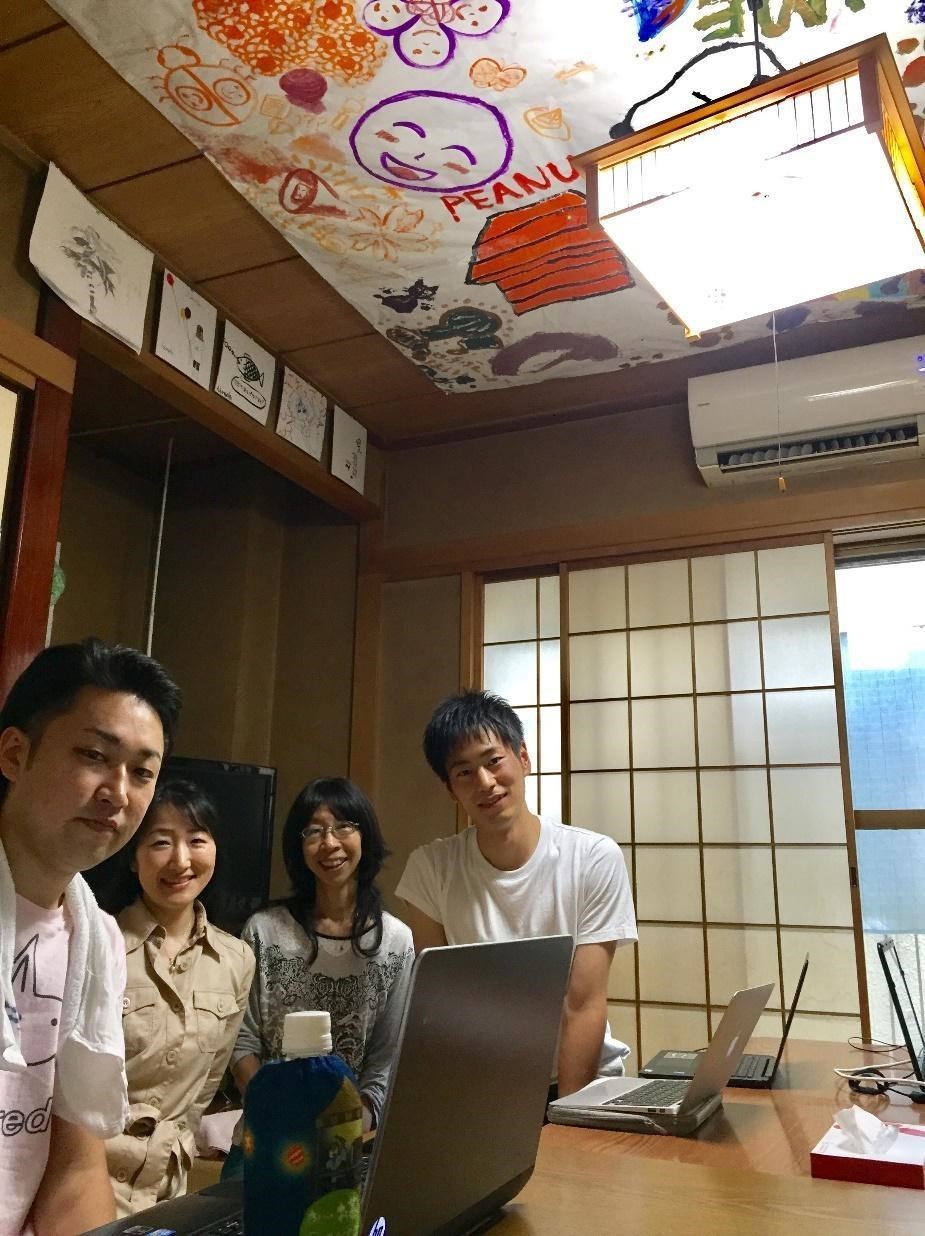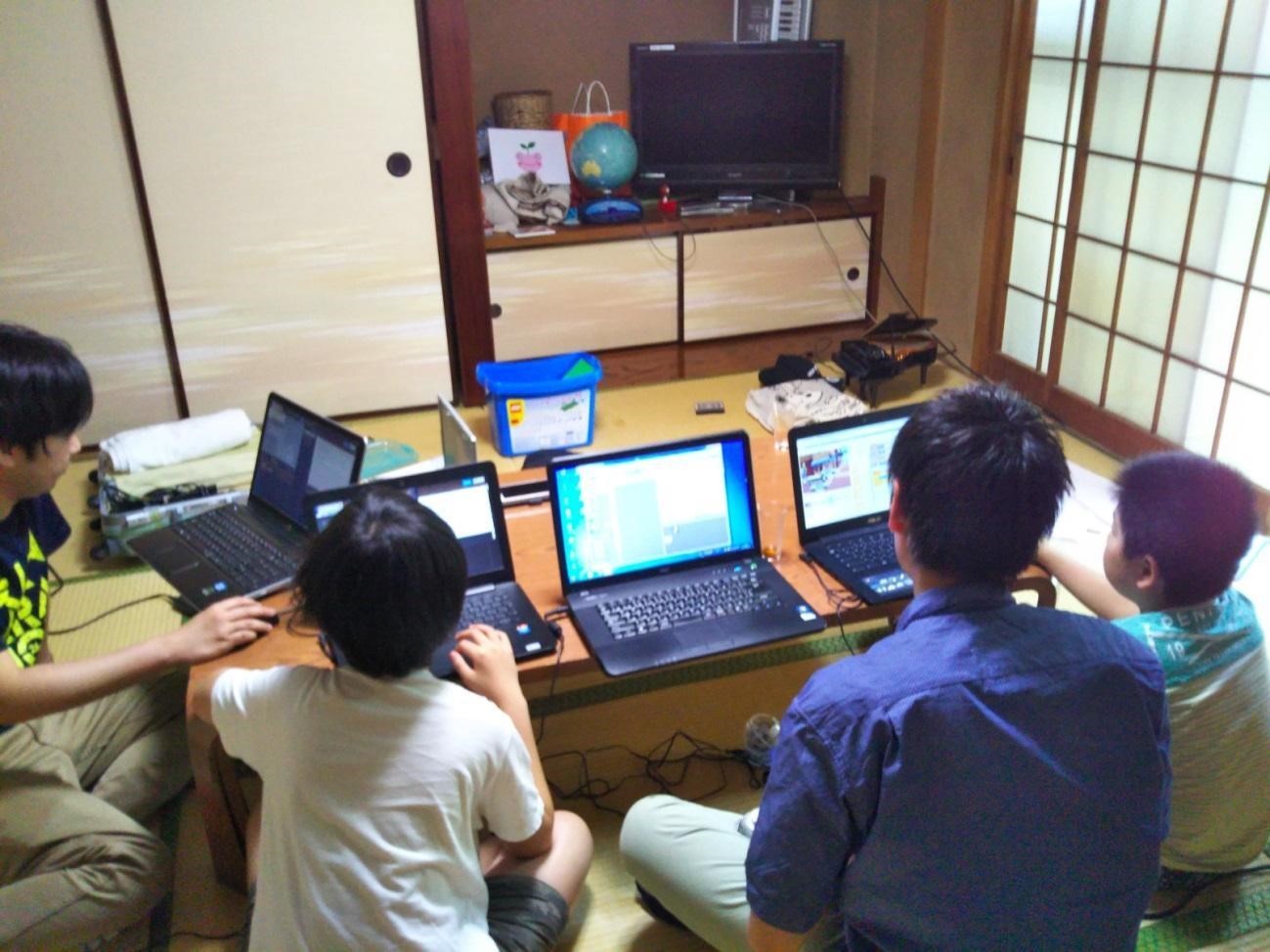NPO Toshima Children's WAKUWAKU Network
NPO Toshima Children's WAKUWAKU Network is an organisation working to combat child poverty by providing support to local children and families based upon three pillars – playing, learning, and living.
FIT Organising Committee, Charity Team Co-Vice Chair Fujino and Comms Team Shima interviewed Executive Director, Keiko Amano, at the WAKUWAKU home, which is also Ms. Amano’s home.

(From the left) Toshima Children’s Wakuwaku Network staff member Mr. Mizushima, FIT For Charity 2017 Charity Team Co-Vice Chair Ms. Fujino, Toshima Children’s Wakuwaku Network Vice executive representative Ms. Amano, and volunteer/programmer Mr. Tsuchiya.
FIT: Please tell us about the WAKUWAKU home.
AMANO: The children we support are mostly living in a low-income single-mother family environment, living in small spaces with busy mothers working to support the family. Their mothers often have little time to spare, coming home late and do not have the luxury to feel at ease. With the consent of the parent, our WAKUWAKU home provides a place for the children to stay for a short period of time, to escape such daily stress or when the relationship between the parent and the child is strained.
When the urgency is high, a child is entered into the child welfare system. However, our aim is to provide the child and parent personal space and time apart so each can regain calmness before the situation escalates.
Sadly, there are cases where the parent lacks parenting skills and the child stops going to school. The parent is not able to wake the child up in the morning, make them breakfast and send them off to school. We hope to be able to have those children stay at the WAKUWAKU home on weekdays and spend time at home over the weekends.
Even if the children do not stay through the night, they are able to come to the WAKUWAKU home to eat meals. Our volunteers also provide computer game development classes and guitar lessons during the weekends.
Using the donation money from FIT For Charity Run, we were able to open the WAKUWAKU home in an area near our three activity pillars of play (Play Park), learning (Free Learning Support), and living (Children’s Cafeteria). The WAKUWAKU home is used by the children who are connected through many of our activities.
FIT: Can tell us how you came to support such children?
AMANO: I was an elementary school teacher in Kobe for four years. Back then, not many children stopped coming to school. There were none at the school I taught at. However, after I stopped teaching in the nineties, more and more children stopped going to school. When the rate of truancy stayed high for 15 years, I was keen to know what was happening at the schools and to meet the children who stopped going. After I stopped teaching, I worked in a different industry but when I moved to Tokyo, I decided to go back to school for a year to become qualified as a psychiatric social worker. I then became a counsellor in Saitama prefecture, and for the first time met a child who stopped going to school.
When I visit their homes, the children are all very unique and charming. I was a part-time employee for a public middle school but since I was at the school five days a week, I was also able to observe what was happening at the school. Although the counselling room was on campus, it was in an area where the children who stopped going to school can access without meeting the other students and the children started to come to the counselling room every day.
I continued working there for 4 years but started to feel restricted and thought about working in the community. I started an organization under the name “Futouko (refusing to attend school) Hikikomori (stay-at-home social withdrawal) Research Centre” in Toshima Ward. I became more aware of child poverty after becoming a social worker but now that I think about it, many of the children who stopped coming to the middle school were from low-income families. There was even a child who ran away from home at night and a child who I thought would had been able to change if a little more support was provided. The schools were still conservative back then, there was no culture of cooperation between various agencies, and I was just a lone counsellor.
However, in 2008, the Ministry of Education, Culture, Sports, Science and Technology started school social worker utilisation project and the schools began to cooperate with child guidance centres. I was able to connect with many people and create teams to protect the children but I wanted to do more. Then I met Ms. Tokiko Kuribayashi, who is the director of WAKUWAKU Networks, we decided to start WAKUWAKU.

FIT: Do you feel motivation to provide such activities?
AMANO: Yes. It is very difficult being a single mother. More than half of single-mother homes live below the poverty line. Working single-parents don’t have the luxury of time or money. Many do not live in an environment where the grandparents live nearby and the children are left alone. Without money, the families cannot hire support. There are many ways the community can support those families. That is what we want this area to become, and find other collaborators along the way.
FIT: When you started living at the WAKUWAKU home, was it difficult to gain cooperation from parents? I heard that it took a year to persuade them.
AMANO: Do you see the artwork on the ceiling? We have been offering workshops for children who stopped going to school for the past 7, 8 years, involving my husband who has a degree in art. As an artist, he doesn’t want to keep doing the same workshops, so he thinks of different themes and subjects and uses different materials to keep the workshops interesting.
To create a safe space for the children in the community, we have opened a café once a week. We have been involving my husband in many of our activities. My husband and I always give each other freedom to do whatever we want and never tie each other down. But when people comes to home where we live, my husband is forced to get involved in our activities nonetheless. I’m glad that he gets along well with the children and plays hide and seek with them.
FIT: Please tell us about the future challenges and initiatives.
AMANO: The donation money we received from FIT will be used to pay for WAKUWAKU home’s rent for three years. Play Park, which is one of our activity pillars, gained recognition and grew into an outsourced service provider for Toshima ward with two full-time employees. Like this example, we would like the WAKUWAKU home to also gain more recognition during the three years in hopes to receive subsidies and grow into an outsourced service provider for the child care support department. We would also like to receive donations from companies for the continued and stable management of the organization. We are currently preparing to be recognised as a Certified non-profit organisation.
FIT: Please send a message to the participants of the FIT For Charity Run.
AMANO: I felt enthusiasm from the people who are participating in the FIT For Charity Run and I feel the kindness of human interaction through the assistance we received during the selection process. A normal grant application usually consists of submitting an application form and waiting for the results.
Our volunteers at the Children’s Cafeteria joined at their own volition, so the atmosphere they create is different from work done for money. Some people who receive help feel like they are looked down upon when they use official services and many refuse the services. However, by connecting with the community through WAKUWAKU Network, everyone is able to connect as an equal member. I felt that the FIT program feel similarly about their volunteers. We hope to be able to proudly serve FIT as a Certified NPO so please continue supporting and believing in us.
FIT: Thank you for sharing your valuable experience with us. We will continue supporting you.
NPO Toshima Children’s WAKUWAKU Network website:
http://toshimawakuwaku.com

